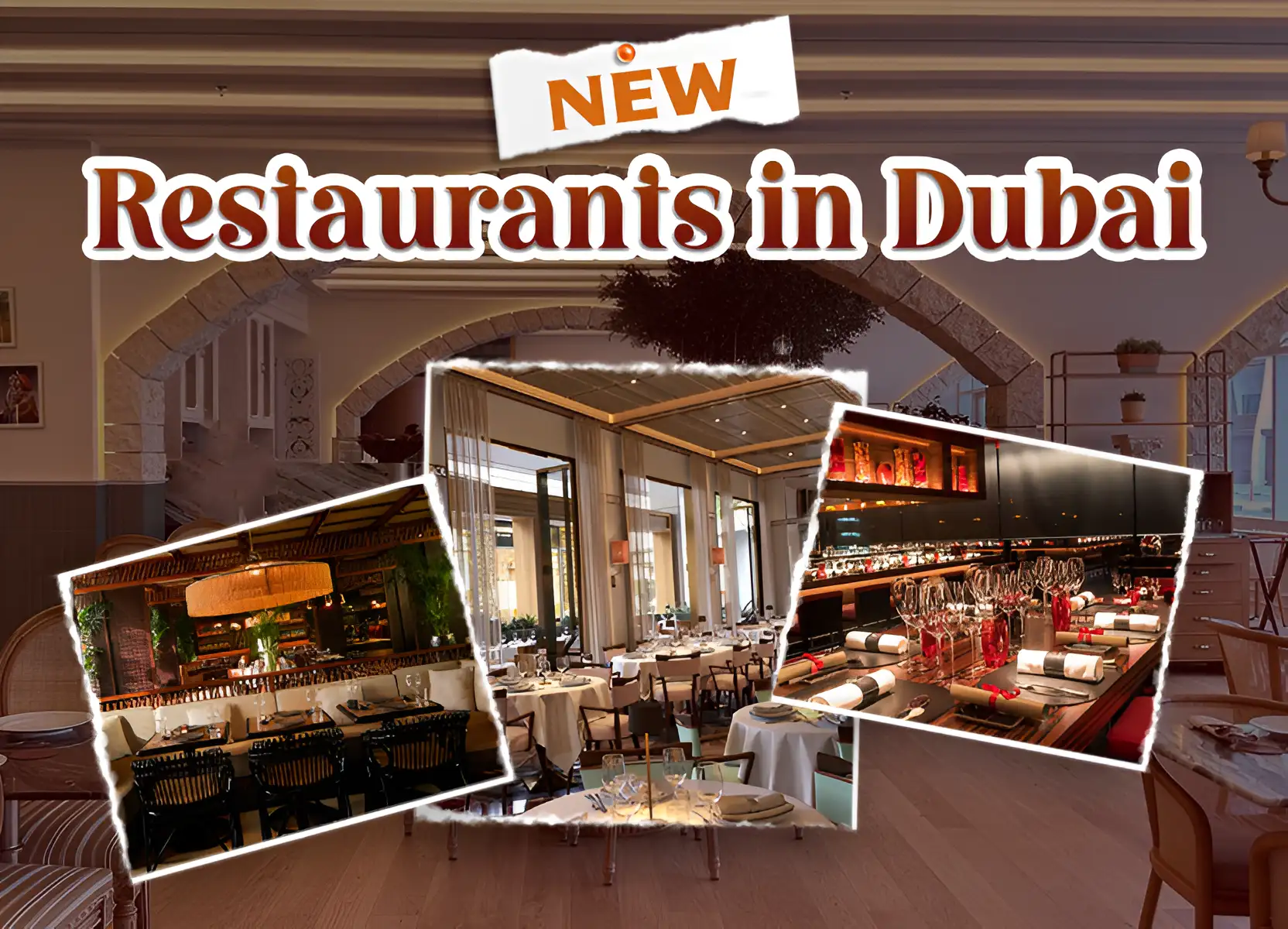Planning Tool Kit
Plan your travel most appropriately. Find out how you can make your travel time memorable.
Best Time To Visit
Visit Dubai between November and March for cooler temperatures, outdoor food festivals, and vibrant culinary events.
Free Things To Do
Stroll through spice souks, visit street food markets, and attend complimentary cooking demonstrations or tastings at local food events.
What To Experience
Savour traditional Emirati dishes, indulge in regional Middle Eastern cuisines, and explore diverse international flavours, while enjoying food-related attractions, festivals, and culinary tours.

Dubai, often called the jewel of the Middle East, is a city where cultures from around the world come together to create a vibrant and diverse atmosphere. This melting pot of influences is particularly evident in the city's food scene, which boasts an eclectic mix of traditional Emirati cuisine, Middle Eastern delights, South Asian flavours, East Asian offerings, and more. With such a vast array of culinary options, there's something to satisfy every palate in this dynamic city.
In this blog post, we'll embark on a culinary journey through Dubai, highlighting some unique and delicious foods that make this city a gastronomic paradise. From traditional Emirati dishes to international fusion, our exploration will showcase the diversity and richness of Dubai's food scene. So, prepare your taste buds and join us as we savour the flavours of Dubai!
Traditional Emirati Cuisine

Emirati food and its origins
Emirati cuisine is deeply rooted in the cultural traditions of the Arabian Peninsula, reflecting the region's nomadic and coastal lifestyles. This culinary heritage has been influenced by trade connections with neighbouring countries and the resourceful use of locally available ingredients. As a result, Emirati cuisine showcases a fascinating blend of flavours and textures that tell the story of the region's history and way of life.
Key ingredients and flavours in Emirati cooking
Emirati cooking relies on simple yet flavorful ingredients, many of which are indigenous to the region. Staples such as dates, rice, and fish feature prominently in Emirati cuisine, as well as a variety of aromatic spices like saffron, cardamom, and cinnamon. Meat, particularly lamb and chicken, is often slow-cooked to achieve tender, succulent results, while fragrant rice dishes are essential to many meals.
Popular Emirati dishes
Harees: A comforting, porridge-like dish made from wheat and meat (usually chicken or lamb), slow-cooked until tender and then seasoned with spices and ghee.
Machboos: A fragrant rice dish cooked with meat (such as chicken, lamb, or fish), vegetables, and a blend of aromatic spices, similar to biryani.
Al Harees: A hearty stew of meat and wheat, traditionally prepared during the holy month of Ramadan and on special occasions.
Balaleat: A sweet and savoury dish consisting of vermicelli noodles cooked with sugar, cardamom, saffron, and rosewater, then topped with a thin layer of scrambled eggs. This dish is typically enjoyed as a breakfast or dessert.Middle Eastern Delights

Influence of regional Middle Eastern cuisines on Dubai's food scene
Given its location at the crossroads of the Middle East, Dubai has embraced a variety of regional cuisines, creating a diverse and delicious food scene. As a result, visitors can indulge in a culinary journey through the Middle East without leaving the city, sampling dishes from countries like Lebanon, Iran, and Turkey.
Signature dishes from countries like Lebanon, Iran, and Turkey
Hummus: A creamy, smooth dip made from mashed chickpeas, tahini, lemon juice, and garlic, hummus is a staple of Levantine cuisine and is enjoyed with warm pita bread or as a side dish.
Falafel: Ground chickpea or fava bean balls or patties that are deep-fried. Falafel is a popular Middle Eastern snack on pita bread with salad, pickles, and tahini sauce.
Kebabs: Originating from Turkey, kebabs consist of marinated meat (such as lamb, beef, or chicken) grilled or skewered and served with rice, vegetables, or bread. Variations include shish kebab, kofta kebab, and doner kebab.
Fattoush: A refreshing Lebanese salad made from mixed greens, tomatoes, cucumbers, radishes, and crispy pieces of toasted pita bread, fattoush is dressed with a tangy, zesty dressing of lemon juice, olive oil, and sumac.South Asian Flavours

South Asian community's impact on Dubai's culinary landscape
With a significant South Asian population in Dubai, the city has embraced vibrant flavours and culinary traditions from India, Pakistan, and Bangladesh. These cuisines are known for their bold flavours, aromatic spices, and diverse dishes, offering many options for food lovers.
Popular dishes from India, Pakistan, and Bangladesh
Biryani: A fragrant rice dish made with layers of aromatic basmati rice, marinated meat (such as chicken, lamb, or fish), and a blend of spices, biryani is a beloved dish in South Asian cuisine. Variations exist across the region, with each version boasting its unique flavour profile.
Butter Chicken: A rich, creamy Indian curry made with tender pieces of marinated chicken cooked in a tomato-based sauce with butter, cream, and a blend of spices. This popular dish is best enjoyed with naan bread or steamed basmati rice.
Paratha: A flaky, layered flatbread originating from the Indian subcontinent, parathas are made from whole wheat flour and cooked on a grill. They can be served plain or stuffed with various fillings such as potatoes, lentils, or paneer. Parathas are often enjoyed with curries, pickles, or yoghurt.East Asian Offerings

The Influence of East Asian cuisines in Dubai
Dubai's food scene is enriched by the presence of East Asian cuisines, offering a taste of China, Japan, and Korea, among others. These culinary traditions are known for their delicate balance of flavours, intricate techniques, and artful presentations, adding a unique dimension to the city's gastronomic landscape.
Dishes from China, Japan, and Korea
Dim Sum: A Chinese culinary tradition originating from the Cantonese region, dim sum consists of small, bite-sized portions of steamed or fried dumplings, buns, and pastries, often served in bamboo steamer baskets. Common varieties include shrimp dumplings, barbecue pork buns, and custard-filled pastries.
Sushi: A quintessential Japanese dish, sushi is made with vinegared rice combined with a variety of ingredients such as raw or cooked fish, seafood, vegetables, and even tropical fruits. Sushi comes in various forms, including nigiri (hand-pressed rice topped with fish), maki (rice and fillings rolled in seaweed), and sashimi (thin slices of raw fish served without rice).
Korean BBQ: A popular dining experience in Korean cuisine, Korean BBQ involves grilling marinated meats (such as beef, pork, or chicken) at the table on built-in gas or charcoal grills. Diners cook the meat to their liking and enjoy it with various side dishes and condiments, including kimchi, pickled vegetables, and ssamjang (a spicy dipping sauce).International Fusion and Contemporary Flavors
The role of fusion cuisine in Dubai's culinary scene
As a global city with a diverse population, Dubai has embraced the concept of fusion cuisine, creatively combining elements from different culinary traditions to create innovative, modern dishes. This fusion trend allows food enthusiasts to experience a unique blend of flavours and techniques, adding a contemporary twist to traditional dishes.
Fusion dishes and innovative culinary creations
Shawarma Sushi: A creative combination of Middle Eastern and Japanese cuisine, shawarma sushi features seasoned grilled meat (such as chicken or beef) wrapped in sushi rolls with rice, cucumber, and a tahini-based sauce.
Indian-Chinese: A popular fusion cuisine that combines the bold flavours of Indian food with the techniques and ingredients of Chinese cooking. Dishes like Chilli Chicken and Hakka Noodles exemplify this culinary marriage, offering a unique blend of spices, heat, and umami flavours.
Arabic-Italian: Combining elements from Arabic and Italian cuisine, this fusion style offers dishes like za'atar-spiced pizza, pasta with tahini sauce, and Arabic-inspired bruschetta with labneh and olives.
The role of innovative chefs and restaurants in shaping Dubai's food scene
Dubai's culinary landscape is constantly evolving, thanks to the creativity of its chefs and restaurateurs. These culinary professionals continually push boundaries, experiment with new ingredients and techniques, and reimagine traditional dishes to keep the city's food scene fresh and exciting.
Conclusion
Dubai's food scene reflects the city's multicultural identity, offering a delightful culinary journey through various regional and international cuisines. From traditional Emirati dishes to modern fusion creations, the city's gastronomic landscape showcases various flavours, techniques, and ingredients, making it a food lover's paradise.
Whether you're a curious foodie or a seasoned traveller, Dubai offers many dining experiences to suit every palate. So, embark on a culinary adventure through the city, savouring the rich tapestry of tastes and aromas that make Dubai's food culture exceptional.
Looking to customize your Next Holidays?
Let Our Travel Experts Help You With Personalized Itineraries for Your Next Trip











